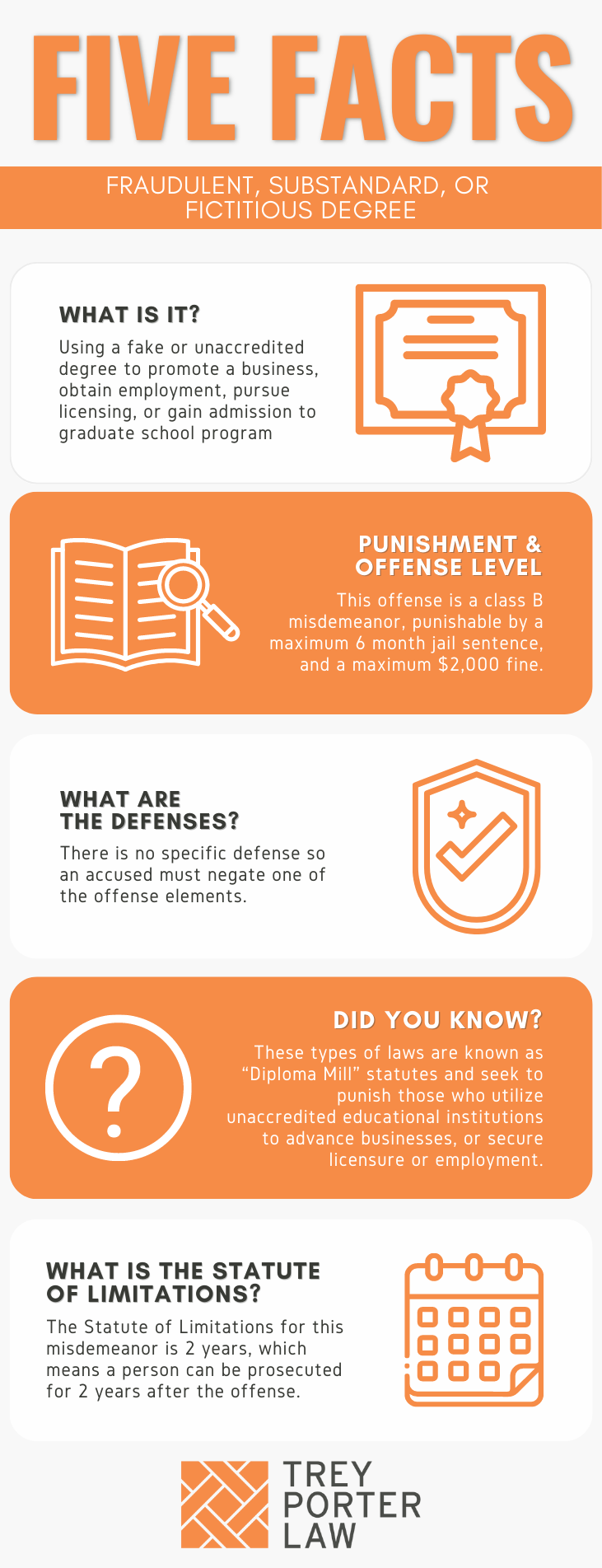WHAT IS FRAUDULENT, SUBSTANDARD, OR FICTITIOUS DEGREE IN TEXAS?
The Texas law against fraudulent, substandard, or fictitious degree prohibits using or claiming to hold a substandard or fraudulent postsecondary degree to promote a business, obtain employment, licensing, certification, promotion, compensation, or other benefits, or to gain admission to an educational program or public office.

- What is a fraudulent or substandard degree? A fraudulent or substandard degree is a degree conferred by a private postsecondary education institution that was not accredited, approved, or authorized to operate under the Texas Education Code at the time it was conferred.
WHAT IS THE FRAUDULENT, SUBSTANDARD, OR FICTITIOUS DEGREE LAW IN TEXAS?
Tex. Penal Code § 32.52. FRAUDULENT, SUBSTANDARD, OR FICTITIOUS DEGREE.
(a) In this section, “fraudulent or substandard degree” has the meaning assigned by Section 61.302, Education Code.
(b) A person commits an offense if the person:
(1) uses or claims to hold a postsecondary degree that the person knows:
(A) is a fraudulent or substandard degree;
(B) is fictitious or has otherwise not been granted to the person; or
(C) has been revoked; and
(2) uses or claims to hold that degree:
(A) in a written or oral advertisement or other promotion of a business; or
(B) with the intent to:
(i) obtain employment;
(ii) obtain a license or certificate to practice a trade, profession, or occupation;
(iii) obtain a promotion, a compensation or other benefit, or an increase in compensation or other benefit, in employment or in the practice of a trade, profession, or occupation;
(iv) obtain admission to an educational program in this state; or
(v) gain a position in government with authority over another person, regardless of whether the actor receives compensation for the position.
(c) An offense under this section is a Class B misdemeanor.
(d) If conduct that constitutes an offense under this section also constitutes an offense under any other law, the actor may be prosecuted under this section or the other law.
WHAT IS THE PENALTY CLASS FOR FRAUDULENT, SUBSTANDARD, OR FICTITIOUS DEGREE IN TEXAS?
The penalty classification for fraudulent, substandard, or fictitious degree is a Class B misdemeanor, punishable by up to 180 days in county jail.
WHAT IS THE PUNISHMENT RANGE FOR FRAUDULENT, SUBSTANDARD, OR FICTITIOUS DEGREE IN TEXAS?
The punishment range for fraudulent, substandard, or fictitious degree, a Class B misdemeanor, is up to 180 days in jail, and a maximum $2,000 fine.
WHAT ARE THE PENALTIES FOR FRAUDULENT, SUBSTANDARD, OR FICTITIOUS DEGREE IN TEXAS?
A person charged with fraudulent, substandard, or fictitious degree may be eligible for probation after a conviction, or deferred adjudication without a conviction, for a period not to exceed two years.
WHAT ARE THE DEFENSES TO FRAUDULENT, SUBSTANDARD, OR FICTITIOUS DEGREE IN TEXAS?
The statute does not authorize specific defenses to fraudulent, substandard, or fictitious degree. A person charged thereof may attempt to negate at least one of the elements the State must prove at trial.
WHAT IS THE STATUTE OF LIMITATIONS FOR FRAUDULENT, SUBSTANDARD, OR FICTITIOUS DEGREE IN TEXAS?
The limitation period for fraudulent, substandard, or fictitious degree is two years.
FRAUDULENT, SUBSTANDARD, OR FICTITIOUS DEGREE IN TEXAS
The laws punishing using or claiming to hold a fraudulent or substandard degree to obtain a benefit are collectively known as the “diploma mill” statutes. A person may be punished for claiming to hold a fraudulent degree to promote a business, get selected for a particular job, or other special treatment reserved only for holders of a true degree.
















